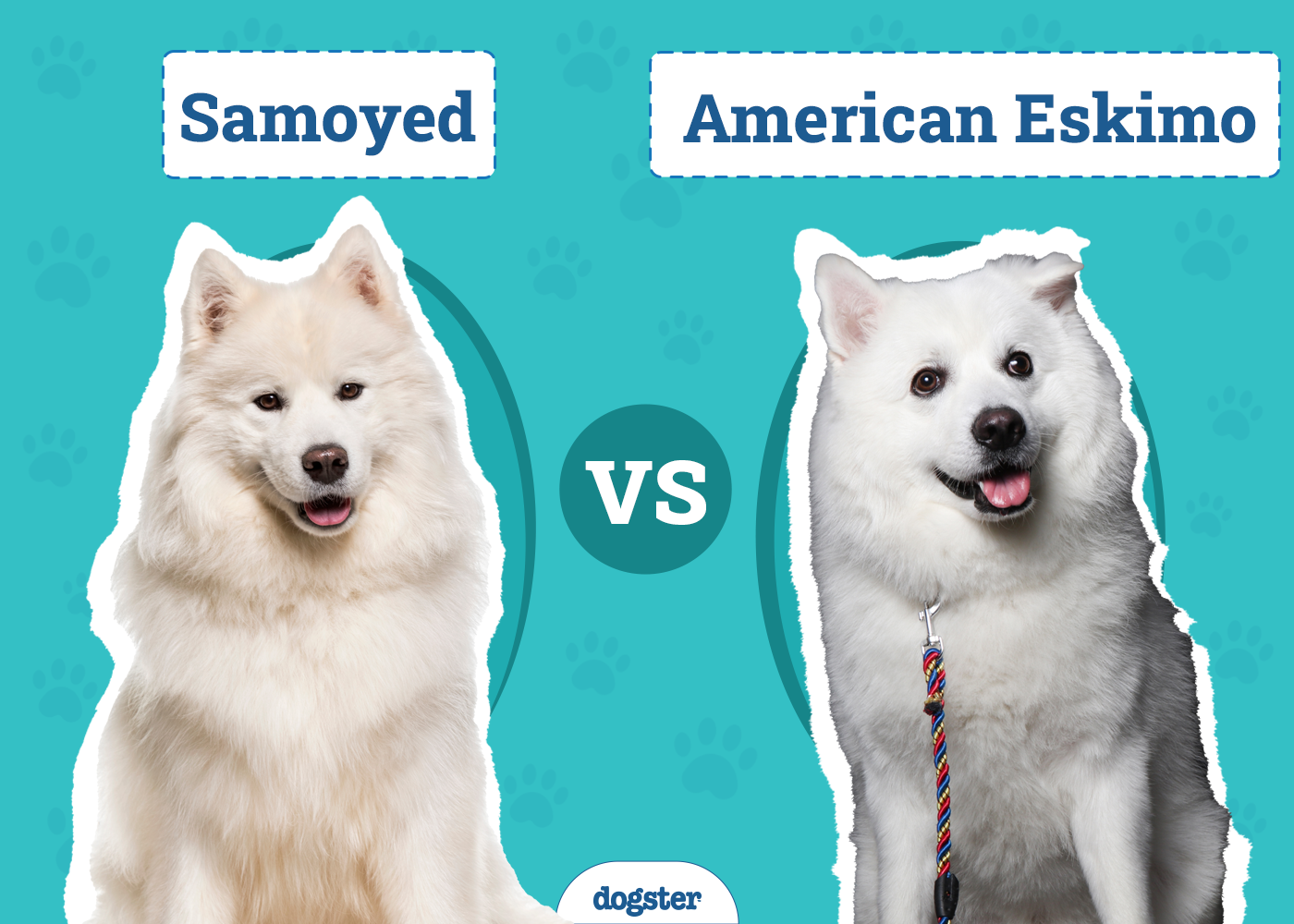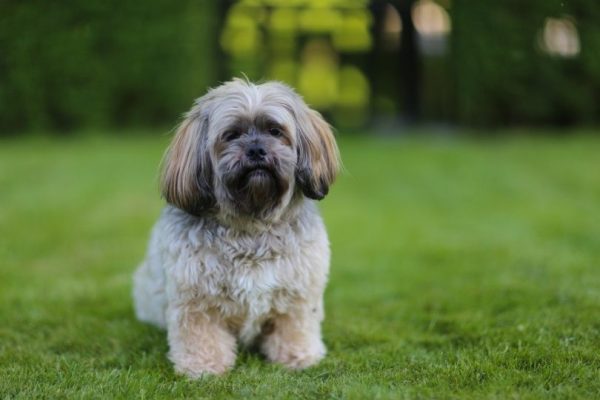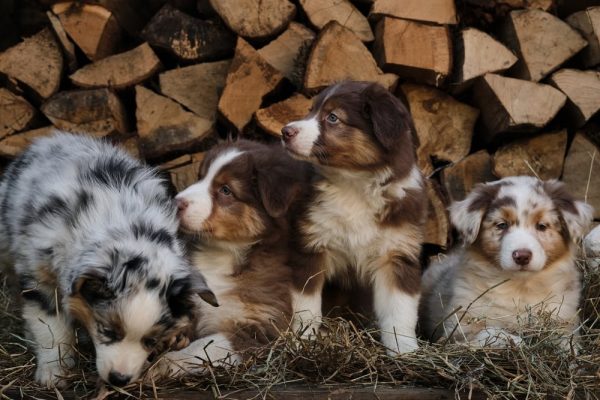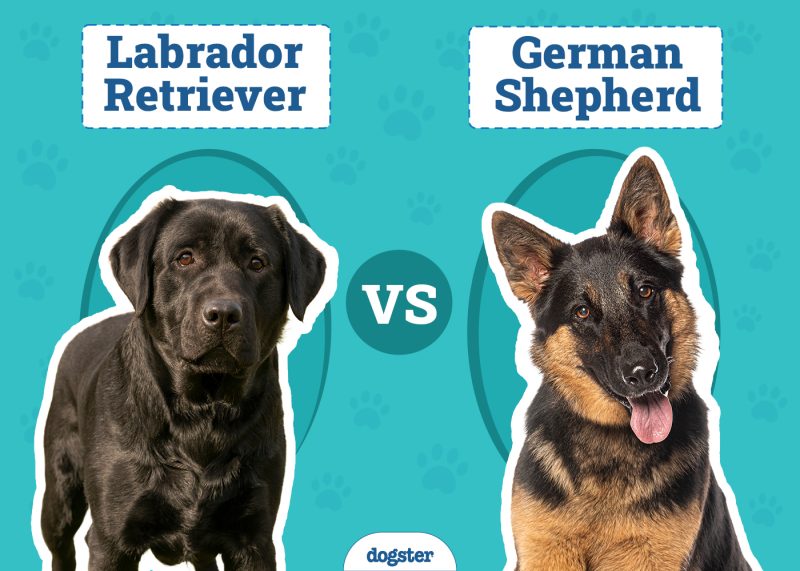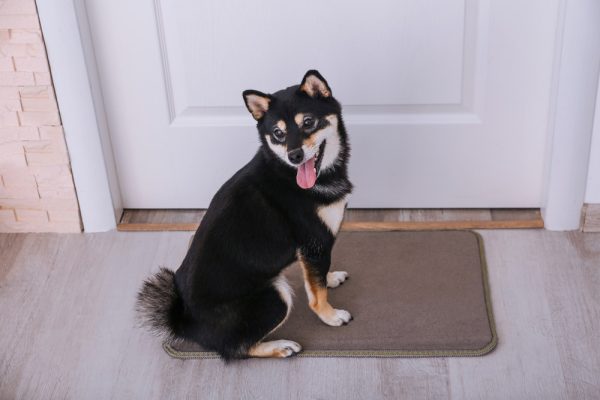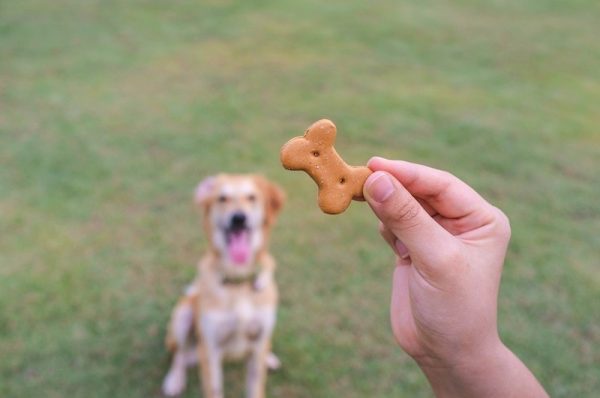In this article
View 3 More +The Samoyed and American Eskimo are two magnificent dog breeds known for their striking appearance and charming personalities. The Samoyed, originating from Siberia, boasts a fluffy, white coat that gives them a regal and almost bear-like appearance. These friendly and gentle dogs are often referred to as “smiling Sammies” for their perpetual happy expressions and outgoing nature.
In contrast, the American Eskimo, despite its name, actually hails from Germany. This breed is characterized by its stunning, snow-white coat and deep, dark eyes, which are framed by a distinctive mane of fur.
With all their similarities, they are often mistaken for one another. Both breeds share a love for cold weather and a rich history of working alongside humans, but they bring their unique charms and qualities to the table, making them beloved pets and excellent show dogs alike. But how can you tell these two breeds apart? How different are they? Read on as we help you determine which dog suits you best!

Visual Differences

At a Glance
- Average height (adult): 19–23.5 inches
- Average weight (adult): 35–65 pounds
- Lifespan: 12–14 years
- Exercise: 1 hour a day
- Grooming needs: High
- Family-friendly: Yes
- Other pet-friendly: Often
- Trainability: Intelligent, stubborn, independent
- Average height (adult): 9–12 inches (Toy), 12–15 inches (Miniature), 15–19 inches (Standard)
- Average weight (adult): 6–10 pounds (Toy), 10–20 pounds (Miniature), 25–35 pounds (Standard)
- Lifespan: 13–15 years
- Exercise: 1 hour a day
- Grooming needs: High
- Family-friendly: Yes
- Other pet-friendly: Often
- Trainability: Intelligent, eager to please, loyal

Samoyed Overview
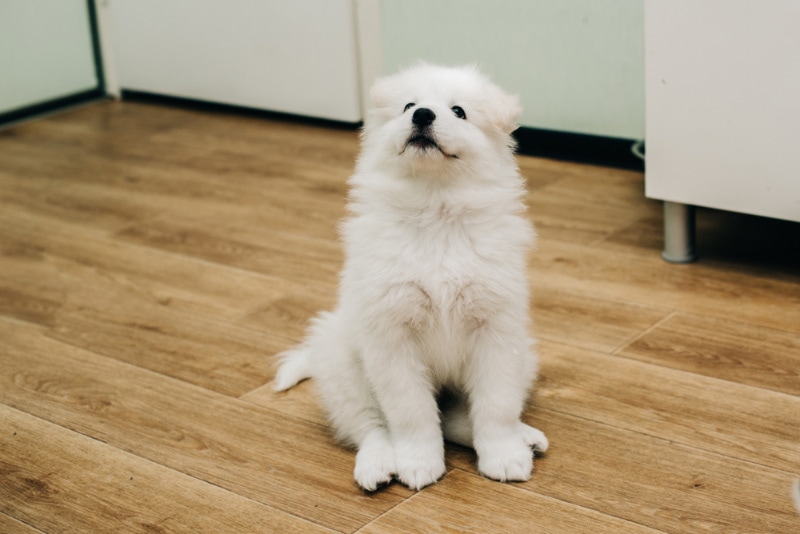
The Samoyed is a captivating and ancient breed that originated from the harsh and frigid landscapes of Siberia, where they were bred by the Samoyedic people for thousands of years to assist in herding reindeer, pulling sleds, and providing companionship to their nomadic human companions.
One of the most distinctive features of the Samoyed is its striking, fluffy white coat, which not only helps them withstand freezing temperatures but also adds to their overall charm. Their friendly and approachable demeanor has earned them the nickname “smiling Sammies” due to their perpetually upturned mouths, a characteristic expression that reflects their cheerful and sociable nature.
Samoyeds are known for their gentle and friendly temperament, making them wonderful family pets and companions. They are known to be exceptionally good with children, often displaying a patient and playful attitude. Despite their imposing appearance, they are not guard dogs by nature but rather excel at forming strong bonds with their owners and delighting them with their affectionate and loyal personalities.
Their love for human interaction and their natural inclination to be around people make them thrive in homes where they receive ample attention, exercise, and mental stimulation. Overall, the Samoyed’s combination of beauty, charm, and devotion makes them a beloved breed among dog enthusiasts worldwide.
Appearance
The Samoyed is instantly recognizable thanks to its stunning appearance. This breed possesses a medium to large build, with a strong, muscular frame covered in a plush, double-layered coat. Their most striking feature is their dazzling white fur, which gives them an almost ethereal appearance.
Samoyeds have a distinct “smile” characterized by upturned corners of their mouths and dark, expressive eyes that radiate warmth and friendliness. Their ears are small and triangular, and they carry their plumed tail over their back.
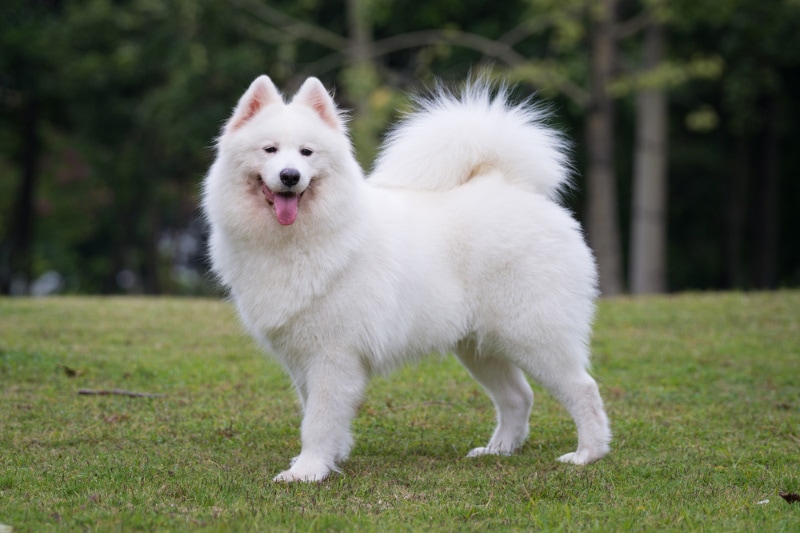
Personality & Temperament
Samoyeds are renowned for their affectionate and outgoing personalities. They are a sociable breed, and their love for human companionship knows no bounds. Sammies are known to be gentle giants, and their friendly disposition makes them excellent family dogs. They are especially good with children and can be quite playful and patient.
Samoyeds are also known for their stubborn streak and can be independent thinkers, so consistent training and positive reinforcement are key to harnessing their intelligence and enthusiasm.
Training & Exercise
Samoyeds are highly trainable dogs, but training requires patience, consistency, and positive reinforcement techniques. These dogs are intelligent and eager to please, but they can also be somewhat stubborn and independent-minded at times.
Early socialization and obedience training are essential to ensure they develop into well-mannered companions. Samoyeds respond well to positive reinforcement methods, such as praise, treats, and play, rather than harsh or punitive training techniques. Consistent training routines and mental stimulation are crucial to keep them engaged and prevent boredom, which can lead to destructive behavior.
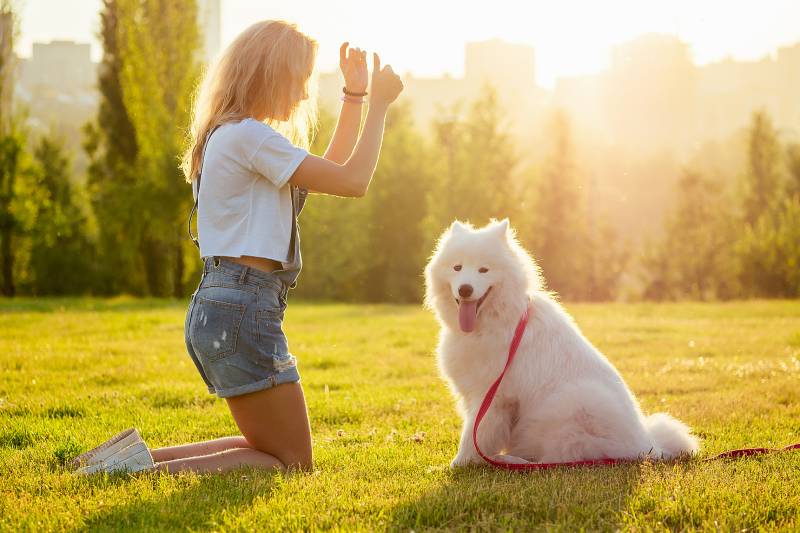
Grooming & Care
Grooming a Samoyed can be a significant commitment due to their thick double coat. Regular brushing is essential to prevent matting and keep their fur in good condition. They are known to shed quite heavily, especially during seasonal changes, so be prepared for some fur maintenance. Samoyeds also require a bath occasionally (once every 2 to 4 weeks) to keep their coat clean and white.
Due to their love for cold weather, they are well-suited to cooler climates, but owners should be cautious in hot weather as their thick coat can make them susceptible to overheating.
Suitable For:
Samoyeds are suitable for families and individuals who appreciate the company of an affectionate, friendly, and sociable canine companion. People who enjoy outdoor activities and can provide regular exercise and mental stimulation will find Samoyeds to be great adventure buddies. Those who don’t mind regular grooming and are prepared for a shedding breed can fully enjoy the beauty and charm of the Samoyed’s stunning coat. Take note, too, that Samoyeds prefer colder environments, so families should take this into consideration when caring for a Samoyed.

American Eskimo Overview
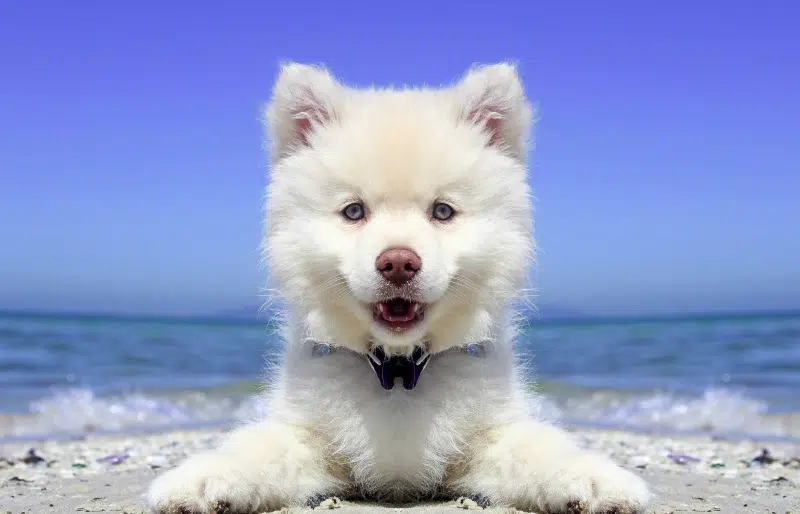
The American Eskimo Dog, affectionately referred to as the “Eskie,” is a striking and intelligent breed. Despite its name, this breed’s origins trace back to Germany, where they were initially bred from Nordic Spitz-type dogs.
American Eskimos come in three size varieties: Toy, Miniature, and Standard. The latter is the most common. Renowned for their agility and grace, they are agile and excel in activities such as obedience, agility, and even as therapy dogs. Eskies are known for their intelligence and trainability, making them well-suited for various canine sports and activities, as well as serving as devoted companions.
They tend to form strong bonds with their owners and are known for their protective instincts, making them effective watchdogs. Despite their protective tendencies, they are typically friendly and outgoing, both with their families and strangers, although early socialization is crucial to ensure a well-rounded temperament. With their striking appearance and charming personalities, American Eskimos make delightful and devoted pets for families and individuals alike.
Appearance
The American Eskimo is a stunning breed with a distinct appearance characterized by its plush, snow-white double coat that gives it a regal and fluffy appearance. Their coat consists of a dense undercoat and a longer, straight outer coat, with a plume-like tail arching gracefully over their back.
Their eyes are almond-shaped and dark, providing a striking contrast against their white fur, and they have a distinctive mane of fur around their neck. Their ears are triangular and stand erect, adding to their alert and attentive expression. American Eskimos come in three size varieties but all share the breed’s signature elegance and charm.
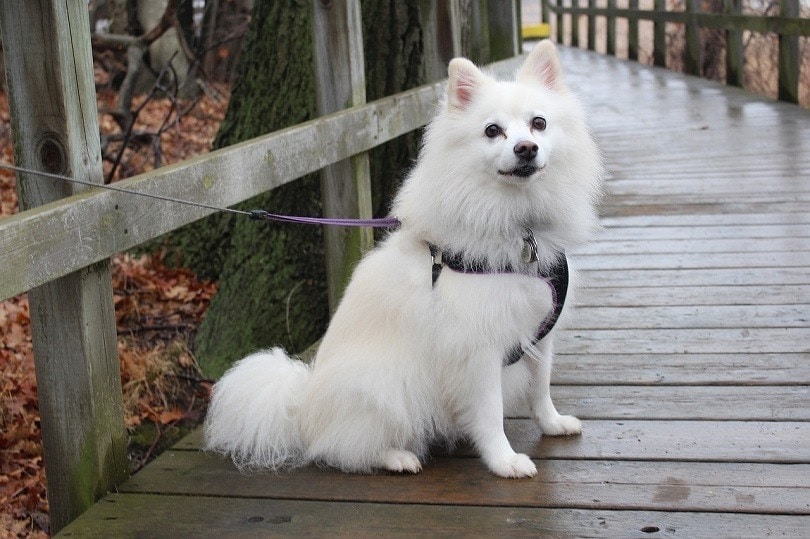
Personality & Temperament
American Eskimos are known for, just like their puffy coats, their larger-than-life personalities! They are social dogs that thrive on human companionship and are often deeply devoted to their families. Despite their small to medium size, they possess a confident and often outgoing demeanor.
They are alert and make excellent watchdogs, quick to sound the alarm if they sense any potential threats. While they can be reserved with strangers, early socialization helps ensure they remain well-mannered and comfortable in various situations.
Their intelligence and willingness to please make them highly trainable, but they can occasionally display a stubborn streak, so consistent and positive reinforcement-based training methods work best.
Training & Exercise
Training American Eskimos can be a rewarding experience, thanks to their high intelligence and eagerness to please their owners. These dogs excel in obedience and agility training, but they do require consistent, positive, and reward-based training methods.
Like the Samoyed, they respond best to firm but gentle guidance, and early socialization is essential to ensure they grow into well-adjusted adults. Eskies thrive when they have mental stimulation and enjoy learning new tricks and commands.
They also require regular exercise to keep both their bodies and minds active, making daily walks and playtime an essential part of their routine.
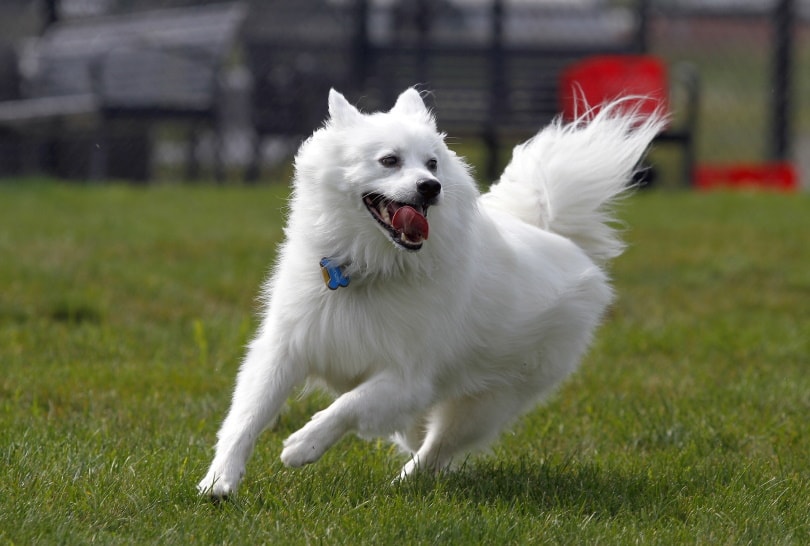
Grooming & Care
Just like the Samoyed, grooming an American Eskimo is a task one should take into consideration when adopting an Eskie due to their thick, double coat. Regular brushing, at least a few times a week, is crucial to prevent matting and to keep their fur in top condition.
Compared to the Samoyed, they only tend to shed seasonally. As seasonal shedders, expect more intensive grooming during seasons of transition such as spring and fall. Additionally, their white coat can be prone to staining, so regular bathing is necessary to maintain their pristine appearance. Routine dental care, nail trimming, and ear cleaning are also part of their grooming routine.
Suitable For:
American Eskimos are suitable for families and individuals that ideally live in a colder climate and are seeking an intelligent, affectionate, and loyal companion. Their alertness and protective instincts make them effective watchdogs, adding an extra layer of security to the household. They are adaptable to various living environments, from apartments to houses with yards, provided they receive regular exercise, mental stimulation, and live in an area with colder temperatures. Like the Samoyed, prospective owners should also be prepared for the responsibility of regular grooming to maintain their pristine white coat.

Which Breed Is Right for You?
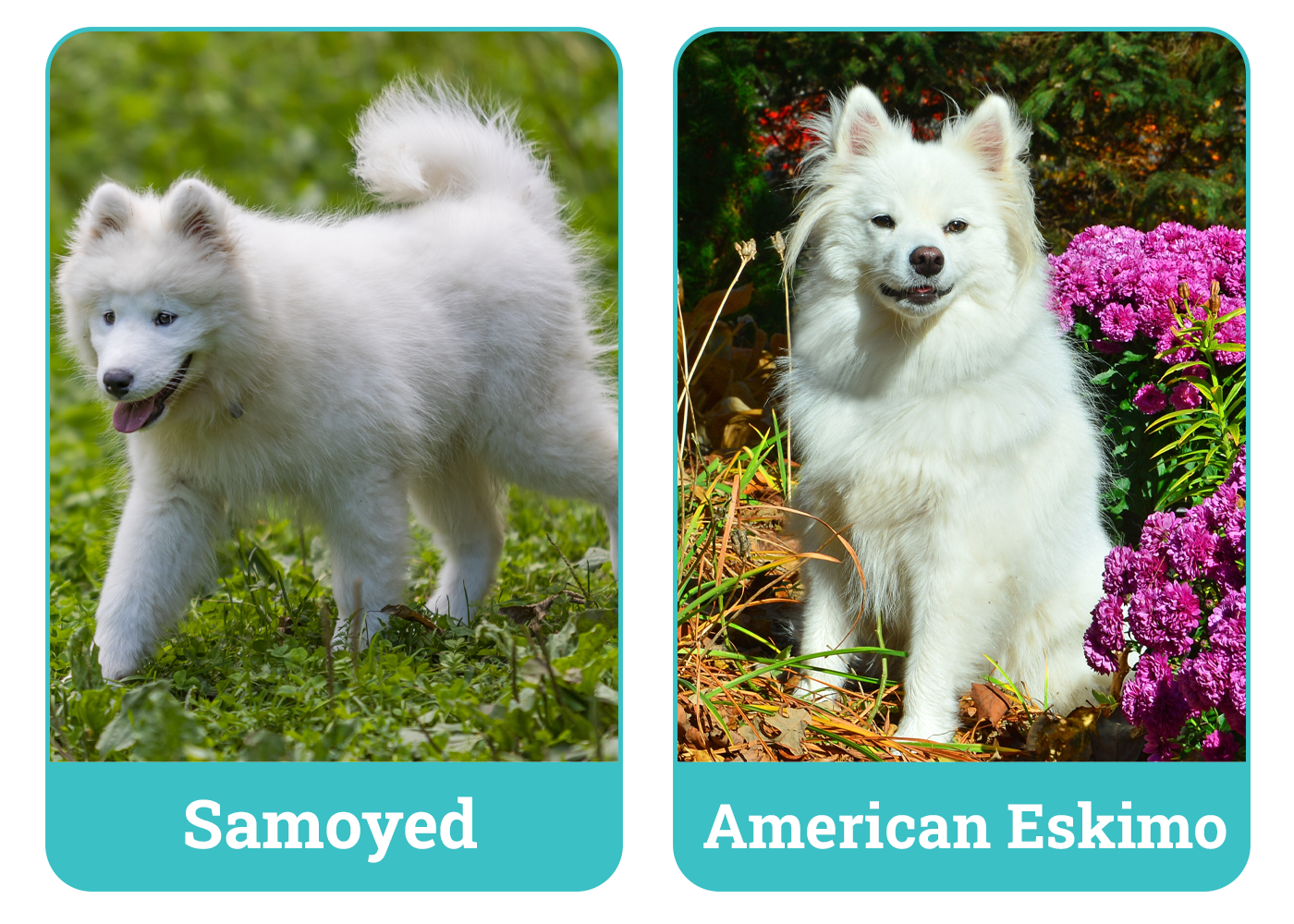
The Samoyed and American Eskimo are two remarkable dog breeds, each possessing its own unique set of characteristics and charm. The Samoyed, with its ethereal, snow-white coat and friendly disposition, offers a loving and loyal companion for families and individuals alike, provided they receive the attention and exercise they deserve.
On the other hand, the American Eskimo, with its striking appearance and lively personality, makes for an intelligent and affectionate addition to any home, particularly if grooming and mental stimulation are provided.
Both breeds, while distinct in their origins and appearances, share a common thread of devotion and companionship, making them beloved pets and cherished members of countless households around the world. Whether it’s the Samoyed’s warm smile or the American Eskimo’s spirited nature, these breeds bring joy and warmth to the lives of those fortunate enough to welcome them into their homes!
See Also:
- Samoyed vs. Husky: The Differences (With Pictures)
- Male vs Female Samoyed: What’s The Difference (With Pictures)
Featured Image Credit: Top – Jenoche, Shutterstock | Bottom – KA_Richer5171321, Shutterstock
